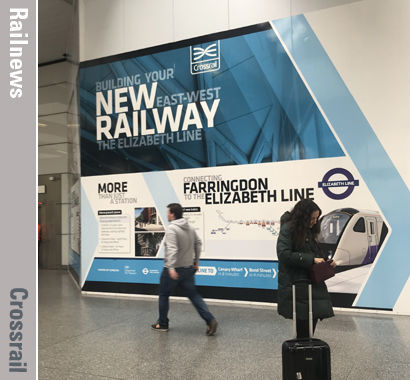Updated 09.30, 10.40
A NEW report from the Commons Public Accounts Committee says taxpayers as well as passengers are paying the price for continuing Crossrail delays.
The link under central London between Paddington and Liverpool Street should have opened in December last year, but there is no firm opening date yet after work on testing the trains and fitting out the stations fell badly behind.
The PAC says commuters and other passengers have been ‘let down by a programme that is well behind schedule and has seen costs escalate far beyond what was originally planned’.
The cost has also risen from a projected £14.8 billion to £17.6 billion, and there is no guarantee that the rises will stop there. The PAC says ‘the final cost still remains unknown’.
The opening date for the key central London section is currently estimated to be between October next year and March 2021.
The Committee’s chair Meg Hillier said: ‘Crossrail is two years late and £2.8 billion over budget. Unfortunately, delay and being over-budget now appear to be par for the course for major rail projects.
‘Crossrail Ltd has failed to understand the complexity and risks of Crossrail, to manage its main contractors, and to integrate different strands of the programme successfully.
‘The Department for Transport is ultimately responsible for the use of taxpayers’ money on Crossrail; it still does not appear to have got a grip of the problems.
‘It has also failed to get a grip of Crossrail Ltd, continuing to pay its executives bonuses, despite the programme going off track.’
The London Assembly’s Transport Committee has already published its own findings, which agree with those of the PAC.
The deputy chair of the Committee, Caroline Pidgeon, said: ‘This report is another damning indictment for all stakeholders involved in Crossrail. Yet another scrutiny body has echoed the same failings we found. It demands the question why Crossrail and Transport for London were so unaware of the stark failings of the project.’
She continued: ‘These failings are ultimately the cause of an increased cost to the public purse and the project being delayed.
‘Despite the perilous financial situation and ongoing project issues, it is utterly dismaying to know Crossrail executives were still being paid huge bonuses. Our report recommended Crossrail revisit the renumeration of chief executives but most importantly, to make sure the right people with the right skills are in the right jobs.
‘Crossrail is a monumental project and will be a great asset to passengers once it is launched. However, lessons must be learnt urgently in order to finish the project and to set a new precedent for future major infrastructure projects.’
The latest verdict from the Public Accounts Committee also echoes a report from the National Audit Office, which was published in early May. This concluded: ‘Crossrail is past the point of no return. Nearly £16 billion has been spent, tunnelling was completed in 2015, trains have been ordered and some are already in service. The way Crossrail has been delivered has driven unnecessary costs and damaged public value.’
Transport for London said: ‘We welcome scrutiny of the Crossrail project and, along with the DfT as Joint Sponsors, have taken a number of actions to strengthen governance and oversight, including changes to both the Crossrail Limited Board and the Crossrail executive team. Everyone involved in this hugely complex project recognises that there is an enormous amount of work still to do before the new line opens and the Joint Sponsors will continue to work with the new Crossrail management team to scrutinise progress.’
Crossrail Ltd added: ‘The Elizabeth line is one of the most complex infrastructure projects ever undertaken in the UK and we recognise many of the challenges raised in the Public Accounts Committee report. The new leadership team’s plan to complete the Elizabeth line continues to be kept under careful review. Progress against our plan will become clearer in 2020, once we start to fully test the operational railway and integrate the train and signalling software. We are fully focused on completing the Elizabeth line and ensuring a safe and reliable passenger service as quickly as possible.’


